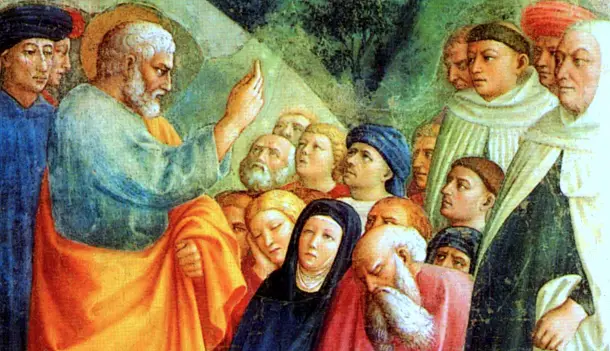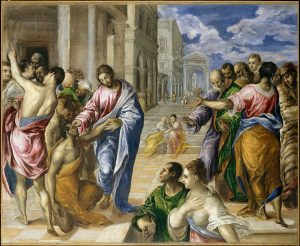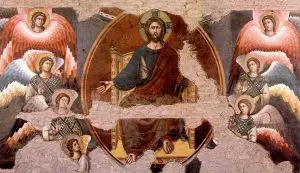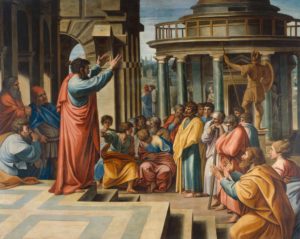Most Christians are at least somewhat familiar with Peter’s response to Jesus’ question, Who do you say that I am?
Matthew 16:15-17 (NASB) He *said to them, “But who do you say that I am?” 16 Simon Peter answered, “You are the Christ, the Son of the living God.” 17 And Jesus said to him, “Blessed are you, Simon Barjona, because flesh and blood did not reveal this to you, but My Father who is in heaven. (emphasis added)
God revealed to Peter that Jesus was indeed the Christ, that is, the Son of God. Unfortunately, due to the influence of post-Biblical orthodoxy, many misinterpret his confession to mean that Jesus is God the Son. If this were true, that Jesus is indeed God, we would expect Peter to repeat this revelation in his post-ascension sermons. Let’s take a look at the apostle’s most famous sermon to find out just who Peter believed Jesus to be.
Peter’s Pentecost Sermon
What did Peter preach on the Church’s inauguration day? Considering that the doctrine of Jesus’ deity and that of the triune God is paramount to Trinitarian theology, we would reasonably expect it to be a part of Peter’s Pentecost proclamation. What we find instead is that both doctrines are absent from this monumental theological occasion. Contrary to any notion that Jesus is God, Peter presents Jesus as a man whom God exalted as the Christ.
Peter begins his message by speaking plainly of Jesus’ humanity, making no mention whatsoever of his supposed deity:
Acts 2:22-23 (NASB) “Men of Israel, listen to these words: Jesus the Nazarene, a man attested to you by God with miracles and wonders and signs which God performed through Him in your midst, just as you yourselves know— 23 this Man, delivered over by the predetermined plan and foreknowledge of God, you nailed to a cross by the hands of godless men and put Him to death. (emphasis added)
A Man From Nazareth Attested to By Miracles
Peter tells the multinational crowd that had gathered in Jerusalem for Pentecost,[1] that Jesus was a man from the town of Nazareth. Not that he literally came down from heaven or that he pre-existed in any way, but simply that this man hailed from a town about 65 miles away.

What’s more, Peter informs the people, and us, that it was God who performed miraculous signs and wonders through the Nazarene. In other words, Peter understood that when he and Jesus walked on water, it was God working through His Messiah to perform this miraculous feat.
This is in stark contrast to the Trinitarian claim that Jesus’ miracles prove he is God. On the contrary, the purpose of the miracles was not to reveal that Jesus was God, but to demonstrate that God was with Jesus. The miracles were an attestation that he was the promised Messiah. Nicodemus, the Pharisee who met with Jesus, said as much:
John 3:1-2 (NASB) Now there was a man of the Pharisees, named Nicodemus, a ruler of the Jews; 2 this man came to Jesus by night and said to Him, “Rabbi, we know that You have come from God as a teacher; for no one can do these signs that You do unless God is with him.” (emphasis added)
Nicodemus understood that the miracles proved that God had ordained Jesus. And this is what Peter preached on Pentecost.
Jesus Died
Peter further reveals Jesus’ humanity by remarking that the Nazarene was nailed to the cross and died. Only those who are mortal can die. Some will respond by saying that Jesus only died in his human nature, while his God-nature did not die. However, this is a bold, presumptuous claim considering the Bible never once says this or even alludes to it. To be sure, the doctrine of Jesus’ supposed dual natures (hypostatic union) was completely foreign to the early Church. It developed over time and didn’t become the official doctrine of the Catholic church until the Council of Chalcedon in 451 AD.
Scripture, on the other hand, testifies that God alone possesses immortality,[2] meaning that it is impossible for Him to die. Furthermore, Scripture tells us that God is not a man.[3] Yet, Peter says that Jesus is a man:[4]
Acts 2:22 (NASB) “Men of Israel, listen to these words: Jesus the Nazarene, a man attested to you by God with miracles and wonders and signs which God performed through Him in your midst, just as you yourselves know— (emphasis added)
 Peter preached that God raised this man from Nazareth, whom the Jews had crucified,[5] from the dead:
Peter preached that God raised this man from Nazareth, whom the Jews had crucified,[5] from the dead:
Acts 2:24 (NASB) “But God raised Him up again, putting an end to the agony of death, since it was impossible for Him to be held in its power. (emphasis added)
God provided the resurrection power. Jesus was its recipient. Death could not possibly hold this man in its grasp because the power of God is greater than death.
Some are heard to say that Jesus raised himself from the dead, thus proving He is God. However, Scripture says almost thirty times that it was God who raised Jesus from the dead. And this is what Peter preached on Pentecost.
Jesus is David’s Descendant
Peter further attests to Jesus’ being resurrected by God when he quotes King David’s prophecy and concludes that it is fulfilled in Jesus:
Acts 2:29-32 (NASB) “Brethren, I may confidently say to you regarding the patriarch David that he both died and was buried, and his tomb is with us to this day. 30 “And so, because he was a prophet and knew that God had sworn to him with an oath to seat one of his descendants on his throne, 31 he looked ahead and spoke of the resurrection of the Christ, that he was neither abandoned to hades, nor did His flesh suffer decay. 32 “This Jesus God raised up again, to which we are all witnesses. (emphasis added)
Peter testifies that Jesus is a man by calling him the descendant of King David. This descendant died but God raised him to immortality.[6] Furthermore, according to King David’s prophecy, God has placed this descendant on the throne. Contrary to orthodoxy, however, it is not God’s throne that he now occupies, but the throne at God’s right hand:
Acts 2:33-35 (NASB) “Therefore having been exalted to the right hand of God, and having received from the Father the promise of the Holy Spirit, He has poured forth this which you both see and hear. 34 “For it was not David who ascended into heaven, but he himself says: ‘THE LORD SAID TO MY LORD, “SIT AT MY RIGHT HAND, 35 UNTIL I MAKE YOUR ENEMIES A FOOTSTOOL FOR YOUR FEET.”‘ (emphasis added)
Purpose of Peter’s Sermon
What was the purpose of Peter’s sermon on this glorious day when God poured out His Spirit on believers? What was it that the apostle wanted his hearers to know for certain?
Acts 2:36 (NASB) “Therefore let all the house of Israel know for certain that God has made Him both Lord and Christ—this Jesus whom you crucified.” (emphasis added)

Peter wanted the people to know that God had exalted Jesus, the man from Nazareth, to His right hand, and made him both Lord and Christ. If Jesus was truly God incarnate, as fourth century Church Fathers would come to believe, he would not require exaltation, nor would he need to be designated Lord, as he would inherently be the exalted Lord. But Peter, under the inspiration of the Holy Spirit,[7] proclaimed that it was God who exalted Jesus to this status. In other words, it was all God’s doing.
Peter concludes his sermon by calling for his hearers to repent of their sins and be baptized in the name of this man from Nazareth whom he calls the Christ (Messiah):
Acts 2:37-42 (NASB) Now when they heard this, they were pierced to the heart, and said to Peter and the rest of the apostles, “Brethren, what shall we do?” 38 Peter said to them, “Repent, and each of you be baptized in the name of Jesus Christ for the forgiveness of your sins; and you will receive the gift of the Holy Spirit. 39 “For the promise is for you and your children and for all who are far off, as many as the Lord our God will call to Himself.” 40 And with many other words he solemnly testified and kept on exhorting them, saying, “Be saved from this perverse generation!” 41 So then, those who had received his word were baptized; and that day there were added about three thousand souls. (emphasis added)
Did Peter preach that Jesus was God? On the contrary, this former fisherman from Galilee preached that Jesus the Nazarene was, in accordance with prophecy, the descendant of King David and the promised Messiah. Furthermore, that God had attested to this truth by performing miracles through Jesus. What’s more, even though he had been crucified, God had raised Jesus from the grave, thus bestowing immortality upon him. This Jesus is now seated at God’s right hand, having been exalted by God to the position of Lord and Christ. Through this man’s name, God now offers forgiveness of sins and salvation to those who repent and are baptized. This is what Peter believed and what he preached on Pentecost. Shouldn’t we start preaching the same message that Peter preached?
Next: Read about Peter’s second sermon: Peter’s Christology at the Beautiful Gate
[2] Acts 17:31; 1 Timothy 6:16.
[3] Numbers 23:19.
[4] Paul also teaches that Jesus is a man in 1 Timothy 2:5. Jesus even says he is a man in John 8:40.
[6] Romans 6:9.




Thank you for putting forth the easy to understand truth about who Jesus is.
You’re welcome! I appreciate you taking the time to read and comment.
God bless!
My question is does the scripture allow for the development of doctrine as the Catholic and practically the Orthodox Church teach. You rightly point out that Peter introduces no new doctrine except the exaltation of Jesus as God’s appointed Messiah, and thus for Israel and her disparate children (for they were all Jews at Pentecost) the choice was stark – repent and believe or perish when God comes in judgement upon that wicked and apostate generation. History confirms that Israel’s place was taken and given to another who should bear the fruits thereof, logically we either see this fulfilled in the conquest of Rome and the nominal rule of her empire under the aegis of Christ or we deny the fulfilment of Christ’s prophecy; in which case we must suspect his resurrection as he would be a false prophet as the descendants of Apostate Judaism claim to this day.
However allowing that Christ did indeed return and judge his enemies, that their divorce was finalized and displayed with the destruction of their Temple, then Christ did indeed confirm a New Covenant with himself as its head, and like Joseph and Pharaoh ‘only in the throne’ is God the Father greater than his Son, and as the story of Joseph clearly depicts it is to Jesus as our ‘Lord and Christ’ (for surely here Paul is using Christ as belonging to Jesus as peculiarly his) any petitions are made and God the Father is present when as family gathered together unity is celebrated and the petty divisions that belong to flesh are transcended for a while.
Having this perspective and finding in John that God’s creative fiat was truly present in Jesus is not the development of the Trinity necessary? How do we answer the claim that Jesus has that same eternal life which was with the Father in himself, for have you not insisted that God alone hath immortality? Yet the boast of the Christian of his Lord is Jesus Christ the same yesterday, today, and forever; but against this and the promise of life to those who hear his voice (and again we must hear Jesus’ voice, it is his voice heard that gives us life) is the stark difference that such life is mediated and dependent upon being in Christ ‘without me ye can do nothing’. How then given the reality for all who seek and are borne along by the spirit to know the living God only in Christ as also God through the eternal Spirit could the Church do otherwise than proclaim that these three are all indeed God and yet there is only one God, because to have that ‘same life which was with the Father’ insists that you have the same nature, does it not?
This doctrine of the Trinity drives one up the proverbial wall, to say Jesus was God it so crass and absurd that good taste alone recoils, but to deny that God was truly in Christ is to lose the joy of Emmanuel, and to reduce the promised comforter or advocate to some ‘active power’ is to suppress the variety of ways in which the Spirit is mentioned many of which insist it is understood as distinct presence.
It is certain that to not allow the development of doctrine is to deny the continuing presence of Christ through the Spirit in the Church, and effectively to reduce Christianity to a mere fossil, indeed the Protestant Reformation it might be argued has destroyed faith throughout the Western hemisphere, but personally I prefer to attribute this to the destructive power of mass media and an education sufficient to make most opinionated but not to truly inform, how wise were the ancient Chinese Emperors in banning printing -:)
Hi Phillip,
Thanks for stopping by the website.
As for your first question, no, I do not believe that Scripture allows for the latter development of the doctrine of the Trinity, especially considering the doctrine contradicts and makes false what has been clearly revealed in Scripture: that God is one, not a tri-part being; Jesus is the human Messiah.
Scripture is profitable for our instruction, especially about the most fundamental element of Christianity, that is, who is God (2 Tim 3:16). What’s more, Paul told the Ephesians that he did not shrink back from declaring to them anything that was profitable, and he never taught the deity of Christ or the doctrine of the Trinity (Acts 20:20). Furthermore, Jude said that “the faith was once for all handed down to the saints” (Jude 1:3). Jude and the other Biblical authors attest that the foundation of this faith that was handed down is that God is the Father and Jesus is his Messiah (Jude 1:1). Jesus is the greatest witness to this truth when he says that God the Father is the only true God (John 17:3). A doctrine that develops beyond the words of Jesus to say that Jesus is God and the Holy Spirit is God, is a false doctrine.
Your second question, “How do we answer the claim that Jesus has the same eternal life in himself that was with the Father” and doesn’t this necessitate that Jesus has the same God nature. The answer is no. That Jesus has the same eternal life does not pose a problem to a Christology that views Jesus as the human Messiah. The context of the verse your question alludes to (1 John 1:12) explains that the eternal life given to us from God is the same life that is in His Son. If we have the Son, then we have this same life in us (1 John 2:25; 5:11-12). Having eternal life in us does not make us deity, nor does it mean that Jesus has a God-nature. We are all humans who have been given eternal life from God, who alone possess immortality.
Jesus has eternal life within himself, not because he inherently possess it, as God the Father does, but because God the Father gave it to him (John 17:2). Hebrews says that when Jesus was raised from the dead (i.e. immortalized, perfected) he became the source of eternal salvation to those who believe (Hebrews 5:9). In other words, he has not always been the source of eternal life, but God exalted him and gave him the power/authority to extend this life to others. This is Jesus’ testimony:
John 5:26 (NASB) “For just as the Father has life in Himself, even so He gave to the Son also to have life in Himself;
If Jesus is God he would not need for God the Father to give him this authority. However, as the now exalted, human Messiah, it is fitting that he be given this power as God’s Christ.
Again, thanks for stopping by. God bless.
A most gracious response.